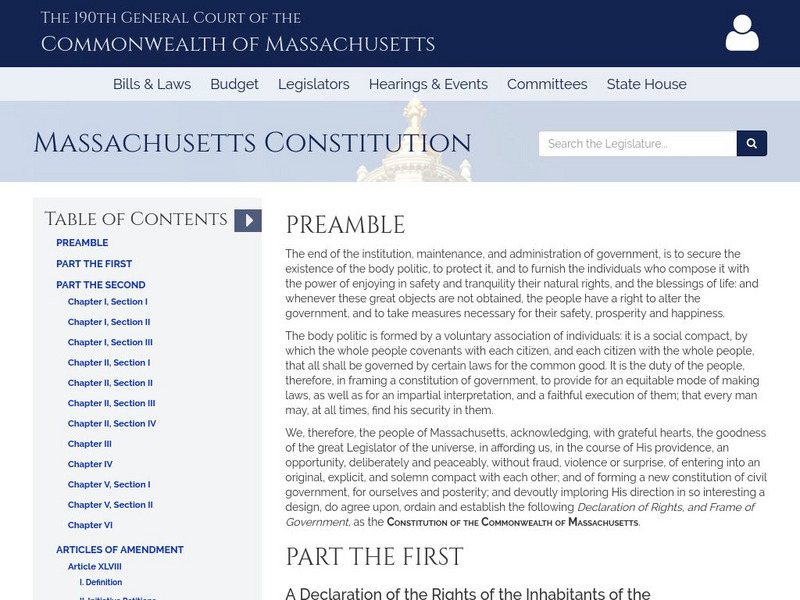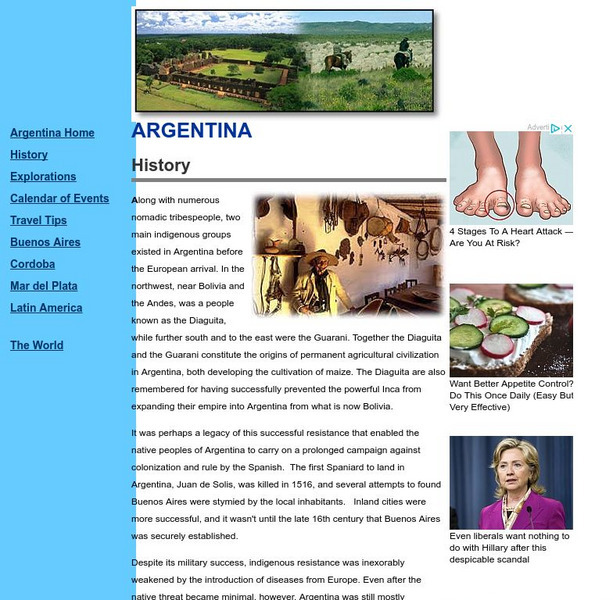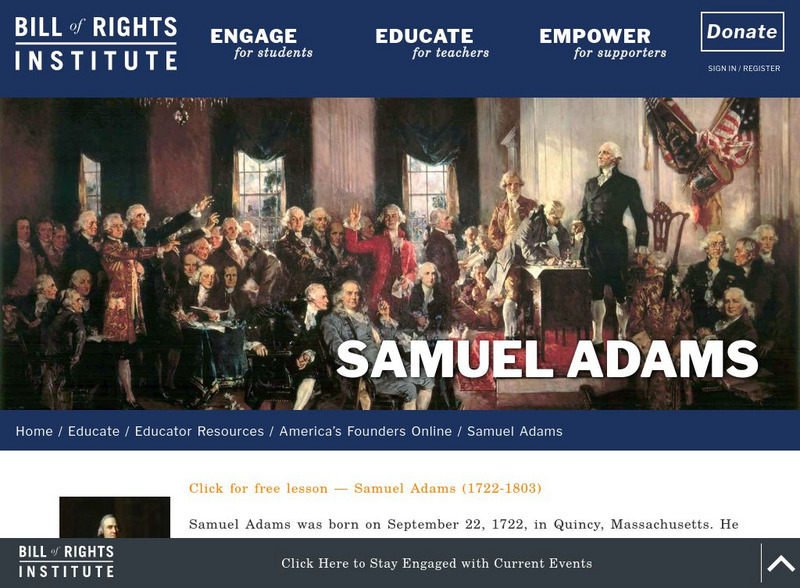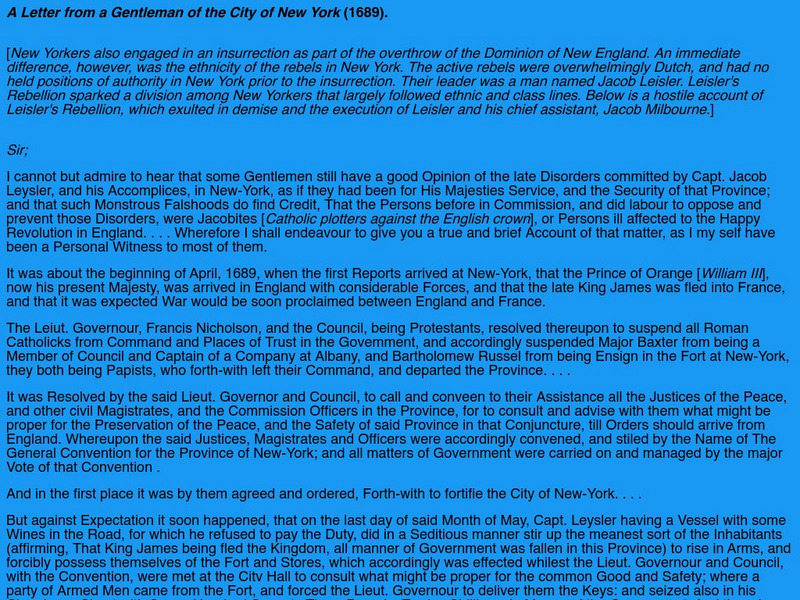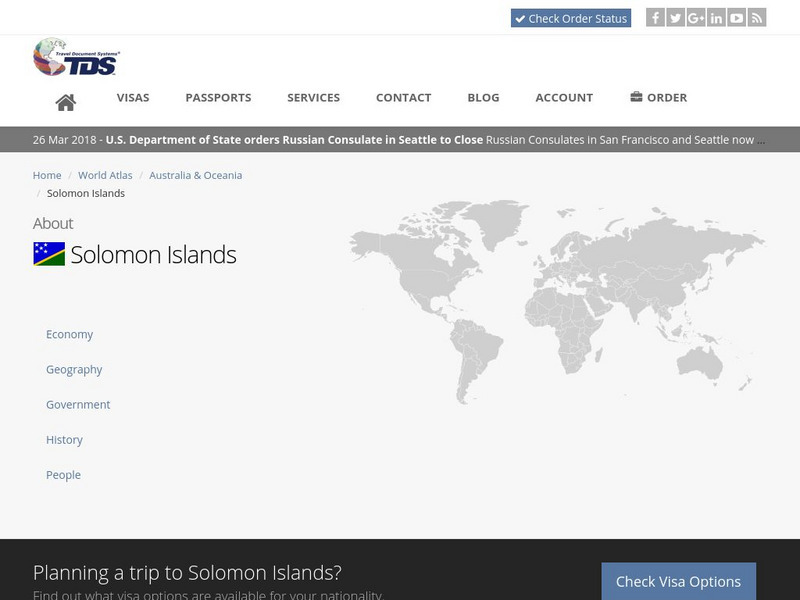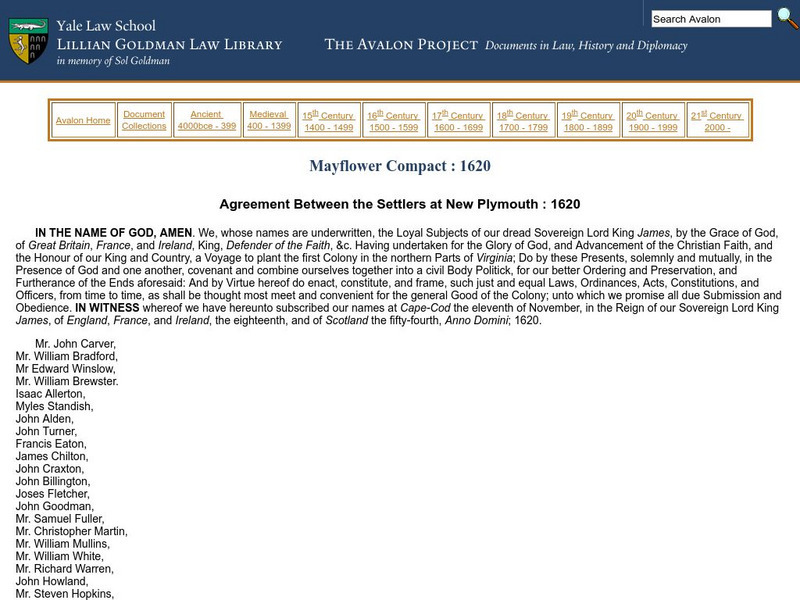Hi, what do you want to do?
Independence Hall Association
U.s. History: Britain in the New World: Jamestown Settlement
Jamestown, although not a financial sucess, was the first succesful English colony in North America. Find out how the colony was financed, what the first colonists hoped to find, how the colony was governed, and the hardships that were...
Other
Commonwealth of Massachusetts: The Declaration of Rights
Read the original, A Declaration of Rights of the Inhabitants of the Commonwealth of Massachusetts, including Articles I through XXX, complete with all parts of the adopted constitution and its amendments for governing colonial...
Independence Hall Association
U.s. History: The Beginnings of Revolutionary Thinking
The American Revolution was close to 200 years in the making. Read about the philosophies and attitudes toward government, as well as the diverse populations who came to the British colonies, that eventually fomented rebellion.
Countries and Their Cultures
Countries and Their Cultures: Xhosa
"Xhosa" is the generic name used for a number of related cultural groups in South Africa. Xhosa groups include the Mpondo, Bomvana, Bhaca, Thembu, Mpondomise, Xesibe, Mfengu, Hlubi, and the Xhosa proper. These Southern Nguni peoples, as...
Digital History
Digital History: The Boston Massacre [Pdf]
This excellent recounting of the days that led up the Boston Massacre and the massacre itself fills in a lot of information that is lacking in textbooks because of space contraints. Read about the British soldiers' and the colonists'...
Digital History
Digital History: Was the Revolution Justified?
A terrific look at the twenty-seven specific reasons Thomas Jefferson cited in the Declaration of Independence and the support for those reasons of why the colonists felt justified in breaking the bonds with Great Britain.
InterKnowledge Corp.
Geographia.com: Chile History and Culture
A long description from Geographia.com with nice photos of both pre- and post-colonial Chile. Different cultural groups are also discussed.
InterKnowledge Corp.
Geographia.com: Argentina History & Culture
This site from Geographia.com has a long description of the history of Argentina and it's culture. Topics covered include the colonial era, the war for independence, and current population groups in Argentina.
Other
Worchester Polytechnic Institute: The Intolerable or Coercive Acts
A brief listing and description of the Acts of the British Parliament that were to be known as the Coercive Acts by Parliament and the Intolerable Acts by the Colonists.
Bill of Rights Institute
Bill of Rights Institute: Samuel Adams
Samuel Adams was born on September 22, 1722, in Quincy, Massachusetts. He entered Harvard College at the age of 14. During the 1760s, Adams became a leader of the Patriot resistance to the British government's attempt to tax the American...
Other
Map: Imperialism and the Balance of Power
World maps of the Colonial Empires of 1914 as well as their revenues during that time period. There are also maps depicting urban growth, type of government, wars and atrocities, and living conditions of the world in 1900.
Other
Bruce Dorsey Syllabus: A Letter From a Gentleman of the City of New York (1689)
A primary source document in the form of a letter that describes Leisler's Rebellion. "Leisler's Rebellion sparked a division among New Yorkers that largely followed ethnic and class lines."
Travel Document Systems
Tds: Solomon Islands: History
Find out about the history of the people who inhabited Solomon Islands, their importance in World War II, and the recent history. Information is from the U.S. State Dept. Background Notes.
British Library
British Library: Discovering Literature: Oroonoko: Historical and Political Contexts
As a young woman, Aphra Behn was a spy for Charles II's government in Antwerp and probably in South America. Two decades later, she used these experiences to write Oroonoko, the story of a prince kidnapped from West Africa, enslaved, and...
University of Virginia
University of Virginia: A View of the Rights of British America
Before writing the Declaration of Independence, Thomas Jefferson made his views known through "A Summary View of the Rights of British America" and other essays. This essay discusses the historical roots of independence and inalienable...
Other
Fales Library and Special Collections: Jacob Leisler Papers Project
Resource chronicles the life and times of Jacob Leisler, "a political figure [who] played a major role in the North American world of European settlements in the seventeenth century," and leader of the Leisler's Rebellion.
Siteseen
Siteseen: Land of the Brave: Middle Colonies
Article on the Middle Colonies provides facts on religion, history, economy, and government of Pennsylvania, Delaware, New York, and New Jersey.
Siteseen
Siteseen: Land of the Brave: New England Colonies
Article explores the religion, government, economics, and history of the New England colonies of New Hampshire, Massachusetts Bay Colony, Rhode Island, and Connecticut.
University of Groningen
American History: Outlines: Louisiana and Britain
One of Jefferson's acts doubled the area of the country. At the end of the Seven Years' War, France had ceded to Spain the territory west of the Mississippi River, with the port of New Orleans near its mouth -- a port indispensable for...
Other
Bringing History Home: Native American History
This 5th grade unit is an introduction to Native American history in the 19th and 20th centuries. The lessons focus on U.S. government policies that have determined the official relationship between the government and Native American...
Yale University
Avalon Project: Mayflower Compact 1620
Read the actual words of these earliest Americans and their attempt at self-government with the writing of the Mayflower Compact. Link directly to other colonial charter pages.
OpenStax
Open Stax: Disaffection: The First Continental Congress and American Identity
By reading this section from a chapter on "Imperial Reforms and Colonial Protests," students will be able to describe the state of affairs between the colonies and the home government in 1774 and explain the purpose and results of the...
University of Nebraska
Digital Commons: The Constitutions of the Free Masons (1734)
The 1734 American edition of the freemasons' constitution in electronic form, a reprint of the 1723 version from London, England. An abstract is provided here, and a link for downloading the complete document. The abstract states that...
US Department of State
Office of the Historian: Treaty of Paris, 1763
The Treaty of Paris was seen as a diplomatic success when it was ratified, however, it encouraged dissension among the colonists and the British government in the long run. Delve into the deal making behind of the scenes between France,...
Other popular searches
- Early Colonial Government
- Spanish Colonial Government
- American Colonial Government
- Describe Colonial Government
- Explain Colonial Government
- Colonial Government Pyramid
- Colonial Government Lessor
- Colonial Government Lesso
- Government in Colonial America






